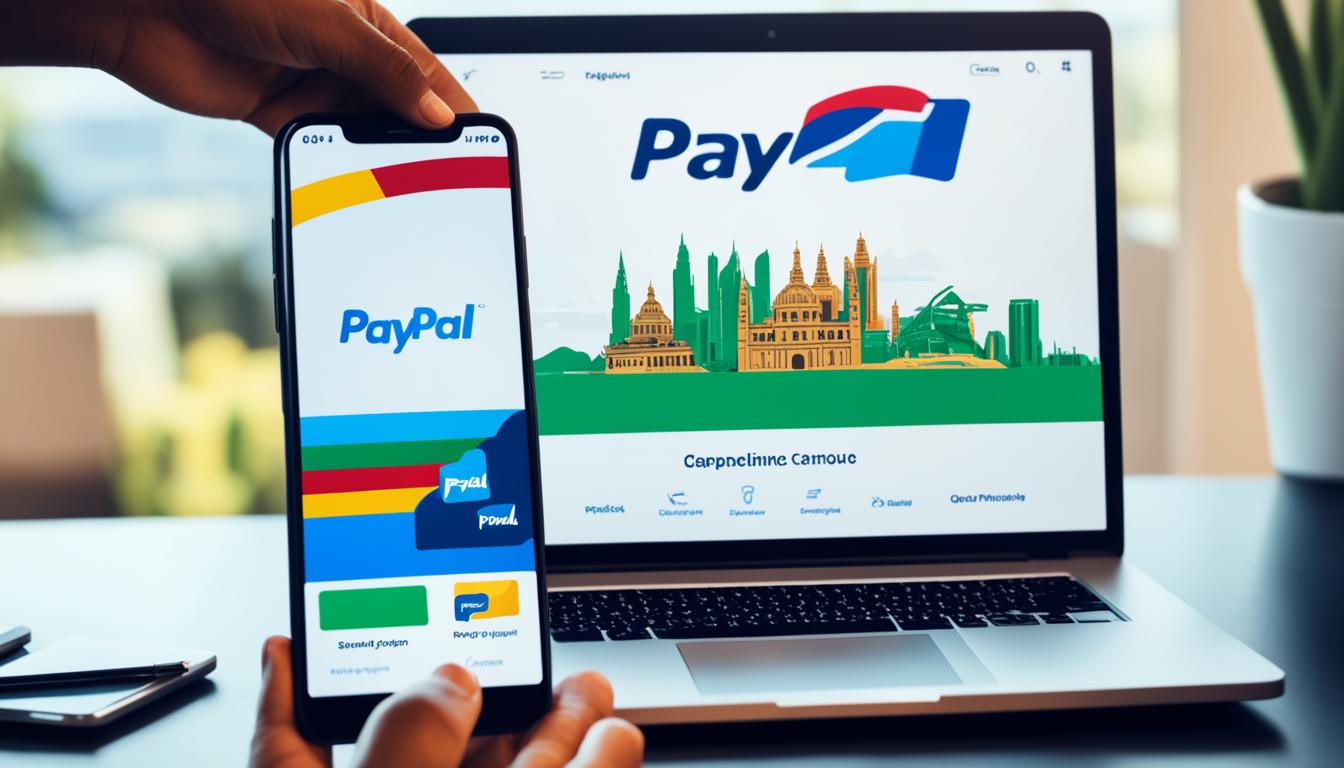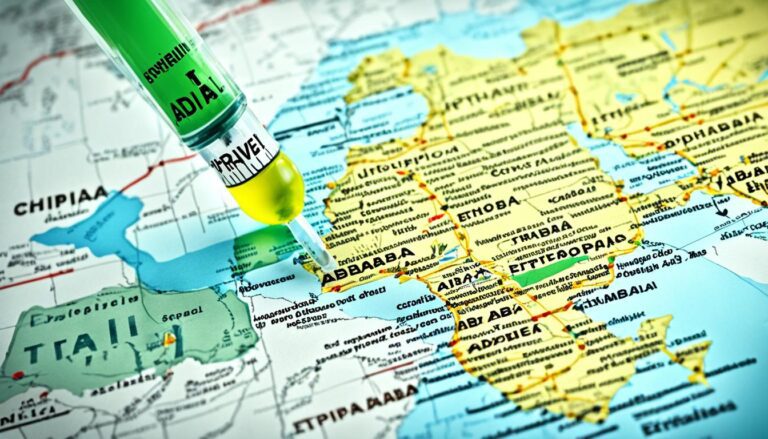Does PayPal Work in Ethiopia?
Did you know that PayPal does not offer its full range of services in Ethiopia? This surprising fact has a significant impact on the ability of Ethiopians to engage in remote work opportunities and fully participate in the global digital economy.
In Ethiopia, individuals can use PayPal to make payments for purchases funded by their credit card. However, they are unable to receive money through the platform. This restriction is due to the policies set by the National Bank of Ethiopia (NBE), which aims to control monetary policy and prevent currency outflow from the country.
The NBE’s restrictions on PayPal hinder Ethiopian individuals, especially the youth, who are seeking remote work opportunities and earning potential from abroad. With the inability to receive money through PayPal, many Ethiopians face limited options and are excluded from the benefits of the digital economy.
So, why can’t Ethiopians receive money through PayPal? What are the alternative options for sending money from Ethiopia? And what is the impact of PayPal restrictions on Ethiopians? Let’s explore these questions and more in the following sections.
Key Takeaways:
- Ethiopians can use PayPal for making payments, but they cannot receive money through the platform.
- The National Bank of Ethiopia’s restrictions on PayPal aim to control monetary policy and prevent currency outflow from the country.
- The lack of access to PayPal’s full range of services hampers the growth of e-commerce in Ethiopia.
- Alternative options, such as Xoom, provide avenues for sending money from Ethiopia.
- The restrictions on PayPal hinder Ethiopians’ ability to engage in remote work opportunities and earn income from abroad.
Why Can’t Ethiopians Receive Money Through PayPal?
The main reason why Ethiopians cannot receive money through PayPal is the restriction imposed by the National Bank of Ethiopia. The NBE aims to control monetary policy and prevent currency outflow from the country. As a result, Ethiopians are unable to receive any currency through the PayPal platform. Moreover, there is a lack of availability of international banks that provide Ethiopians with credit cards that can be linked to their PayPal accounts. While Ethiopians can send money through PayPal for purchases funded by their credit card, they are unable to receive any payments, hindering their ability to engage in remote work and earn money from abroad.
This restriction on PayPal transactions has significant implications for Ethiopians, particularly the youth who are seeking remote work opportunities and earning potential from abroad. Many remote job platforms prefer to use PayPal as the preferred method of payment. With the inability to receive money through PayPal, Ethiopians are limited in their options for earning income remotely, which impacts their financial stability and economic growth.
“The restriction on PayPal transactions creates barriers for Ethiopians looking to leverage their skills and earn money online. It hampers their ability to tap into the global digital economy and explore remote work opportunities.”
Furthermore, the lack of access to PayPal’s full range of services poses obstacles for e-commerce in Ethiopia. With the increasing popularity of online shopping and digital transactions, the inability to fully utilize PayPal’s features limits the growth potential of local businesses and entrepreneurs.
Despite these challenges, it’s important to explore alternative options for Ethiopians to send and receive money digitally. One such option is Xoom, a PayPal service that allows individuals to transfer money online safely and securely. Xoom provides Ethiopians with the ability to send money for cash pickup, mobile wallet, or bank deposit to various locations and banks throughout Ethiopia. While it may not fully replace PayPal, Xoom offers an alternative avenue for financial transactions in a digital world.
Key Points:
- Ethiopians cannot receive money through PayPal due to restrictions imposed by the National Bank of Ethiopia.
- Lack of availability of international banks that provide credit cards for linking to PayPal accounts further limits receiving capabilities.
- The restriction hinders Ethiopians from accessing remote work opportunities and earning income from abroad.
- Potential impact on e-commerce growth in Ethiopia due to limited access to PayPal’s full range of services.
- Xoom, a PayPal service, offers an alternative option for digital money transfers in Ethiopia.
Alternative Options for Sending Money from Ethiopia

While PayPal may not be fully accessible for Ethiopians, there are alternative options for sending money from Ethiopia. One such option is Xoom, a PayPal service that allows individuals to transfer money online safely and securely. With Xoom, Ethiopians can send money for cash pickup, mobile wallet, or bank deposit to various locations and banks throughout Ethiopia. The process is quick and easy, with the ability to send money using PayPal payment options. Xoom also offers competitive exchange rates and a convenient mobile app for sending money and tracking transactions.
If you’re an Ethiopian individual looking for a reliable and convenient way to send money within the country, Xoom is a great choice. Whether you need to support your family, pay bills, or send money to a loved one, Xoom provides a seamless digital experience for online payments in Ethiopia.
Here’s why Xoom stands out:
- Safe and Secure: Xoom ensures the privacy and security of your transactions through its trusted platform.
- Versatile Delivery Options: You can choose between cash pickup, mobile wallet, or bank deposit for your recipient’s convenience.
- Wide Network Coverage: Xoom offers extensive coverage across various locations and banks in Ethiopia, making it easier for your loved ones to receive the funds.
- Competitive Exchange Rates: Xoom provides competitive rates to ensure you get the most value for your money.
- Convenient Mobile App: With the Xoom mobile app, you can send money on the go and track your transactions with ease.
Additionally, Xoom allows you to send money using PayPal payment options, providing you with flexibility and convenience. Whether you’re sending money for personal or business purposes, Xoom simplifies the process of online payments in Ethiopia.
The Impact of PayPal Restrictions on Ethiopians

The restrictions imposed by the National Bank of Ethiopia on PayPal have a significant impact on Ethiopians, particularly in the realm of e-commerce and remote work opportunities. With the inability to receive money through PayPal, many Ethiopian youth who are seeking remote work opportunities are faced with limited options.
Several platforms that offer remote job opportunities prefer to use PayPal as the preferred method of payment. Unfortunately, due to the restrictions, Ethiopians are unable to fully participate in the global digital economy and harness the earning potential that comes with remote work. This limitation hampers their ability to earn income from abroad and contributes to the economic challenges faced by many individuals in Ethiopia.
Moreover, the lack of access to PayPal’s full range of services hinders the growth of e-commerce in Ethiopia. PayPal is widely recognized and trusted as a secure payment method globally, making it an essential tool for online transactions. However, without the ability to receive money through PayPal, Ethiopian businesses and entrepreneurs face barriers in establishing and expanding their e-commerce platforms.
“The restrictions placed on PayPal limit our ability to access a wider customer base and hinder the growth of our online business,” said Woyneab, a small business owner in Ethiopia. “We rely on alternative payment methods, but they are not as widely accepted or secure as PayPal.”
Despite these challenges, Ethiopians have been resourceful in finding alternative solutions to navigate the limitations of PayPal. Some have resorted to using international money transfer services and digital payment platforms that are available in the country. However, these alternatives may not offer the same level of convenience, security, and global accessibility as PayPal.
It is evident that the impact of PayPal restrictions extends beyond the inability to receive money. The limitations hinder economic growth, restrict earning potential, and impede the full participation of Ethiopians in the global digital economy. Addressing these restrictions and exploring opportunities to expand PayPal services in Ethiopia could provide significant benefits for individuals, businesses, and the overall economic landscape of the country.
The Potential for Economic Growth
Enabling Ethiopians to use PayPal for receiving money would open up opportunities for individuals to engage in remote work and earn income from abroad. Freelancing platforms and international job opportunities are increasingly relying on PayPal as a secure and convenient method of payment. By allowing Ethiopians to receive money through PayPal, the National Bank of Ethiopia could foster economic growth by empowering the youth and providing them with means to access global job opportunities.
Expanding E-commerce Reach
By lifting the restrictions on PayPal, Ethiopian businesses and entrepreneurs could tap into the benefits of e-commerce on a much larger scale. PayPal’s trusted and recognized brand would facilitate secure online transactions, boost customer confidence, and promote the growth of local businesses. With the growing trend of online shopping and global e-commerce, expanding access to PayPal would position Ethiopian businesses to compete in the international market and contribute to the country’s economic development.
Conclusion
In conclusion, PayPal’s availability and services in Ethiopia are limited due to the restrictions imposed by the National Bank of Ethiopia. While Ethiopians can utilize PayPal for certain purposes, such as making payments for purchases funded by their credit cards, receiving money through the platform is not possible.
This restriction hampers the ability of Ethiopians to fully participate in the global digital economy and seize remote work opportunities. The National Bank of Ethiopia’s policies aim to control monetary policy and prevent currency outflow from the country, but they also hinder the growth and potential benefits that platforms like PayPal can bring to individuals in Ethiopia.
Despite these limitations, alternative options, such as Xoom, offer avenues for sending money from Ethiopia. Xoom, a PayPal service, allows individuals to transfer money online securely and conveniently. Although it does not provide a full substitute for PayPal, it provides some relief for those seeking to make digital transactions.
To foster economic growth and provide opportunities for individuals in Ethiopia, it is crucial for the National Bank of Ethiopia to reassess their policies regarding PayPal. Allowing Ethiopians to receive money through platforms like PayPal can unlock the country’s potential in the global digital economy and empower individuals to participate in remote work opportunities.





